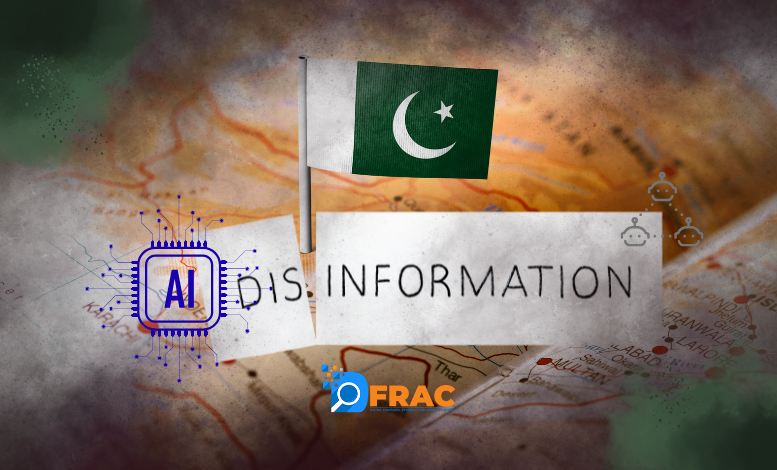Listen to the article
In the digital age, a new dimension of India-Pakistan tensions has emerged through sophisticated information warfare tactics, raising concerns about regional stability and media integrity. Recent analysis shows Pakistani security, intelligence and media entities increasingly utilizing artificial intelligence, bot networks and manipulated content to shape anti-India narratives.
During brief hostilities between India and Pakistan in May 2025, social media platforms were flooded with false claims about military successes, infrastructure destruction and alleged political upheaval in both nations. These fabricated stories spread rapidly before fact-checkers could verify information, creating confusion among audiences on both sides of the border.
A comprehensive study by the Center for the Study of Organized Hate (CSOH) documented how AI-generated visuals, recycled video game footage and doctored images were strategically deployed to present fictional “battlefield wins” and shape public perception. Maharashtra law enforcement officials specifically noted that Pakistani operatives “used AI and video games for fake videos” throughout the conflict period.
The disinformation arsenal employed several sophisticated techniques. Bot networks—automated or semi-automated accounts—amplified false posts, helping narratives gain traction before verification could occur. AI-generated deepfakes and manipulated visuals, sometimes repurposed from video games or historical conflicts, were presented as current events. In one notable instance, footage from a commercial video game was circulated as evidence of Pakistani rocket attacks.
Perhaps most concerning was how these fabricated narratives sometimes jumped from social media to mainstream news outlets, creating a dangerous cycle where “fake news becomes news.” During the May conflict, false narratives emerged almost instantaneously, making real-time verification nearly impossible and heightening panic and mistrust.
The real-world implications of this digital disinformation are profound. When false information circulates in crisis situations, it elevates the risk of dangerous miscalculations by military and political leadership. Erroneous reports of strikes, aircraft losses or political instability can unnecessarily escalate tensions in already volatile environments. Beyond immediate security concerns, these misleading narratives fuel fear, nationalistic sentiment and public distrust in institutions.
Security analysts note that Indian audiences must develop greater awareness that online content during crisis periods may be part of coordinated influence operations. The sophisticated use of AI, bots and manipulated media represents a significant evolution in information warfare tactics, requiring India to develop not just military preparedness but also informational resilience.
Several countermeasures could help address these emerging threats. Strengthening fact-checking capabilities and media literacy represents a crucial first line of defense. Encouraging platforms, regulators and educational institutions to build capacity for detecting deepfakes, bot networks and manipulated content would help mitigate the impact of disinformation campaigns.
During periods of heightened tension, quick-response fact-checking units and collaborative industry-government task forces could more effectively identify and counter false narratives. Social media platforms must also improve transparency around bot activity, flagged posts and manipulated content, particularly during cross-border conflicts.
Public awareness campaigns could help citizens develop healthy skepticism toward viral content during crises. While politically challenging, regional cooperation frameworks addressing digital threats might help prevent dangerous escalation fueled by misinformation.
Modern conflict increasingly unfolds in both physical and digital domains simultaneously. While disinformation tactics aren’t exclusively one-sided, evidence suggests Pakistani proxies and influence networks are systematically leveraging these digital tools. For India, acknowledging these threats, building digital resilience, and raising national awareness about information manipulation must become core components of its security strategy.
In today’s environment of hybrid warfare, controlling the narrative can sometimes prove as strategically valuable as controlling physical territory—a reality both nations are increasingly confronting in their complex relationship.
Fact Checker
Verify the accuracy of this article using The Disinformation Commission analysis and real-time sources.




7 Comments
This is a troubling development, as it demonstrates how advanced technology can be weaponized for political and security purposes. Stronger international cooperation is needed to address cross-border disinformation campaigns.
The use of AI-generated visuals, recycled video game footage, and doctored images to shape false narratives is quite concerning. Fact-checking efforts need to keep up with these evolving tactics.
Absolutely. Disinformation can spread rapidly on social media before it can be verified, sowing confusion and division. Robust media literacy and fact-checking are crucial to combat this threat.
The use of AI and bot networks to manipulate information during the 2025 India-Pakistan conflict is a worrying sign of the times. We must remain vigilant against the erosion of media integrity and public trust.
Agreed. Disinformation can have real-world consequences, especially in regions with long-standing tensions. Developing effective countermeasures should be a priority for policymakers and tech companies.
Interesting to see how AI and bot networks are being used for disinformation campaigns between India and Pakistan. This raises serious concerns about the integrity of information and regional stability.
This article highlights the evolving nature of information warfare and the growing threat of AI-driven disinformation campaigns. Maintaining transparency and accountability in the digital sphere is crucial for regional stability.